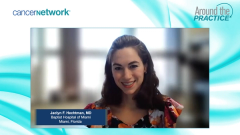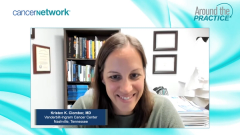
Updates in the Management of KRASG12C-Mutated Metastatic CRC
Centering discussion on KRASG12C-mutated metastatic colorectal cancer, panelists highlight recent clinical studies of targeted agents in this subset of disease.
Episodes in this series

Transcript:
Cathy Eng, MD: Talking about small patient population, Dr Saab, let’s talk about KRAS G12C. Once again, emphasizing the importance of testing despite the small patient population and what it can mean for patients. Can you mention a couple of the trials regarding KRAS G12C and what is the percentage of patients that have this?
Tanios S. Bekaii-Saab, MD: Absolutely. This is the non-druggable pathway. For all of us this was such an excitement to see first point of entry into drugging a pathway that we thought would be almost impossible to go after. Fortunately, we have one. Unfortunately, it represents right now a small proportion of patients. Looking forward to KRAS inhibitors but G12C is present in about 2% perhaps to 2.5% of all patients with metastatic colorectal cancer. Prognostically it’s one of the more aggressive RAS mutations when you separate essentially this one, I would say G13D, these tend to be some of the more aggressive RAS mutations. Now, KRAS G12C, the KRAS protein at least including G12C cycles between guanosine triphosphate, so GTP which is the on, and then GDP which is the off. Its protein resynthesis is about a day or so at a half-life. When we think about the patients with KRAS mutations overall, when they get to second line and beyond the response rate is about from traditional chemotherapies is about 1% to 5% and medium PFS is 2 to 3 months. This is an area of significant need and there are 2 agents that are being explored in colorectal cancer. There are others also coming down the pipe but the ones that are most relevant to the discussion today would be adagrasib and sotorasib. Both are inhibitors of KRAS G12C irreversible and selective for the protein. Adagrasib has a long half-life of about 24 hours and doesn’t love brain penetration is relevant for very small percent of patients in our practices. First adagrasib, adagrasib was looked at in a study called KRYSTAL-1 which essentially is phase 1b and 2 with multiple arms. But the phase 1b was focused on colorectal cancer with adagrasib and cetuximab and we will go to why cetuximab, and then the phase 2 was colorectal monotherapy and did include some patients essentially from the phase 1 like BRAF mutations. And RAS mutation belong to that MAPK pathway and what’s being observed is that in colorectal cancer that’s what makes this an important discussion, inhibiting just RAF or RAS does not by itself induce enough responses and even when you see responses, they are not sustainable and the reason for that is because you have this adaptive resistance mechanism that essentially looks back and brings EGFR back into the fold. It’s important because BRAF mutations and RAS mutations predict for lack of response for EGFR inhibitors, but when you block the activated or the gene responsible for the activated mutation in that pathway, then you need to reintroduce the EGFR inhibitor to get your response. With adagrasib monotherapy, indeed, the response rate was about 19% to 20%, perhaps, and the duration of response was about 4 months. With adagrasib, the toxicities were relatively few, at least at a high-rate grade III. Less than 5% of patients would have meaningful toxicities and none had enough toxicity to stop the agent. When you combine the 2, adagrasib and cetuximab in those G12C mutated colorectal cancers, the response rate now is 46%. Interestingly, in this cohort of patients, the disease control rate was a 100%, so no patients with available disease have progressed. The medium duration of response is almost double, little bit less than double, and almost double with when compared to adagrasib, it was 7.6 months, and many patients are ongoing for more than 2 years now. The toxicities again relatively well tolerated, grade 3 toxicities were seen in about 9% of the patients, less than 10%. Overall, very well tolerated, and meaningful in terms of the response. The other agent, sotorasib was looked at with panitumumab and again as part of this large multi arm studies, could break 100 and the initial phase 2 colon cancer results were reported about few months ago showing essentially response rate for single agent of about 10%. Now, the detail with sotorasib and panitumumab was presented at ESMO and it was on 40 patients and the response rate was about 30% and disease control rate about 90%. Again, the grade 3 toxicities did occur in a relatively acceptable number of patients, but I’d say about 20% overall. It was interesting to see that this combination consistently is showing some of the results we have seen with adagrasib and cetuximab although perhaps a little bit less of a response. It’s tough to say why without randomization which likely will never happen but overall, targeting KRAS G12C along with an EGFR inhibitor seems to induce a response for about a third to half of the patients. Many of these responses tend to be quite durable. Both agents are being looked at now in phase 3 studies with KRYSTAL-10 for adagrasib plus cetuximab, which is standard chemotherapy FOLFIRI and FOLFOX. For sotorasib, it is being looked at with panitumumab in more refractory patients versus TAS-102 or regorafenib. We are going to have more data. We move forward to randomized studies and adagrasib moving the combination closer to first line and second line.
Cathy Eng, MD: Thank you so much Tony, I appreciate that update on G12C patients.
Transcript edited for clarity.
Newsletter
Stay up to date on recent advances in the multidisciplinary approach to cancer.












































